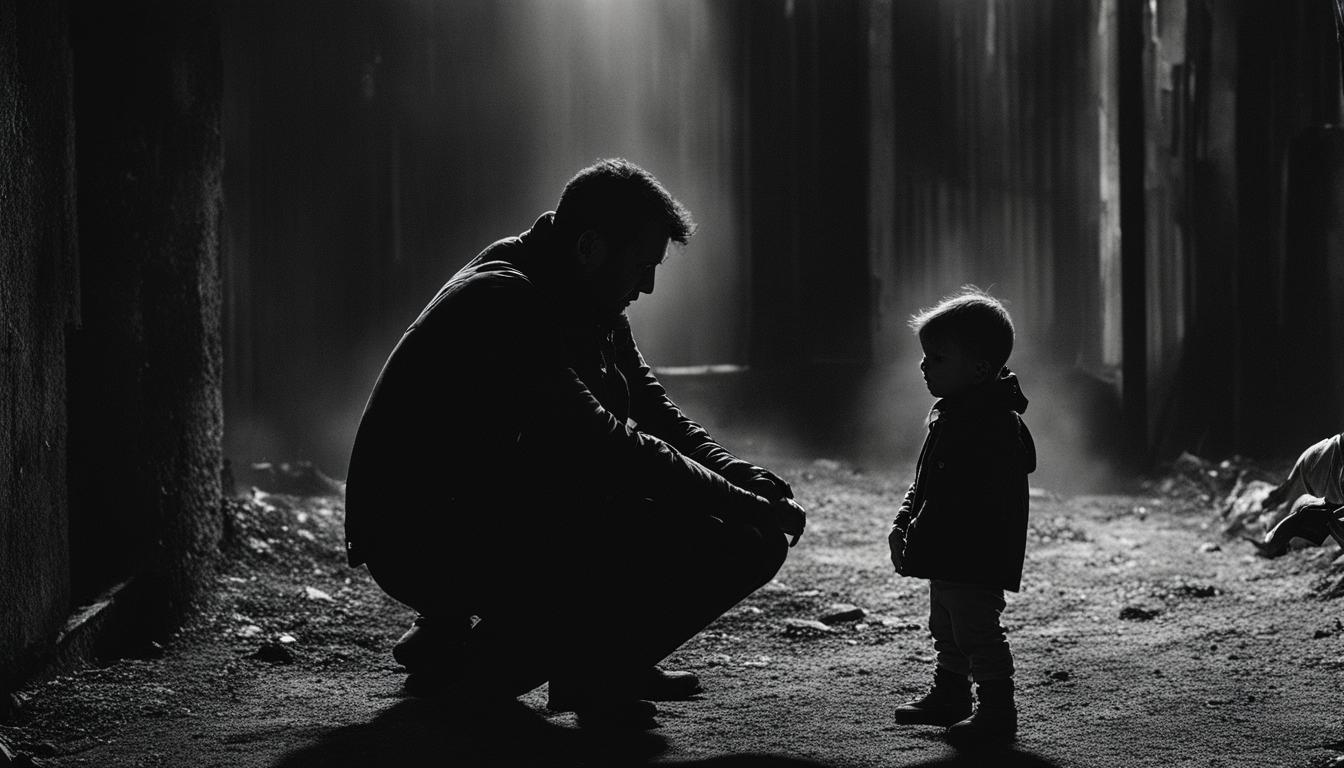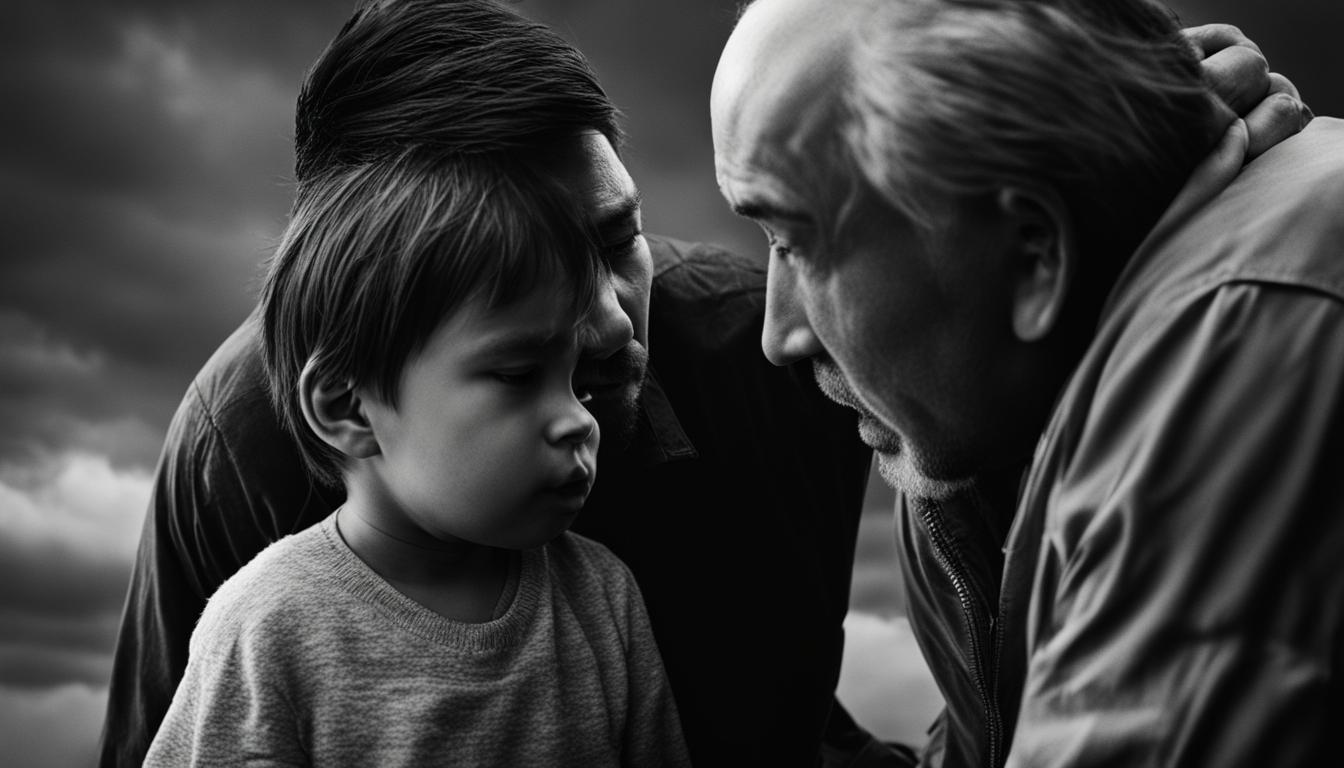Thank you for reading our article on the impact of fathers with borderline personality disorder on family dynamics. Having a father diagnosed with borderline personality disorder (BPD) can have long-lasting effects on children’s development and family relationships. It is crucial to recognize how these influences can affect a child’s mental health, interpersonal relationships, and overall development.
Borderline personality disorder affects an equal number of men and women, but it is diagnosed more frequently in women. It has a prevalence of 3-5% in the general population and up to 30% in inpatient settings. Factors such as genetics, environment, and development contribute to the onset of BPD. Symptoms of a borderline father can include role reversals, extreme feelings of emptiness and fear of abandonment, manipulative behaviors, emotional dysregulation, and trust issues.
Key Takeaways:
- Borderline fathers can have a significant impact on a child’s emotional growth and overall well-being.
- The unstable emotions and manipulative behavior of a borderline father can create an unpredictable and inconsistent environment for the child.
- Family dynamics can be disrupted by the manipulative behavior and emotional dysregulation of a borderline father.
- Children raised by borderline fathers may experience psychological effects such as low self-esteem and identity confusion.
- There are strategies to cope with a borderline father and promote emotional well-being for both the child and the family.
Understanding the Impact of Borderline Fathers on Child Development
Growing up with a borderline father can have a profound impact on a child’s development. The unstable emotions and manipulative behavior of a borderline father can create an environment of unpredictability and inconsistency, which can negatively affect a child’s emotional well-being and behavior. The role reversals, extreme feelings of emptiness, and fear of abandonment can lead to confusion and insecurity in a child. The lack of trust and constant need for validation from a borderline father can also hinder a child’s ability to form healthy relationships and develop a strong sense of self. Therefore, it is crucial to understand the impact that a borderline father can have on a child’s development and take steps to mitigate any negative effects.
| Effects of Borderline Fathers | Child Development and Family Dynamics |
|---|---|
| Unstable emotions | Emotional well-being and behavior |
| Manipulative behavior | Healthy relationships and sense of self |
| Role reversals | Confusion and insecurity |
| Feelings of emptiness and fear of abandonment | Trust and validation |
The Influence of Borderline Fathers on Family Dynamics
The presence of a borderline father can have a significant impact on family dynamics. The manipulative behavior and emotional dysregulation exhibited by a borderline father can disrupt the stability and harmony within the family unit.
Constantly seeking validation and approval, borderline fathers create a tense and chaotic atmosphere due to their unpredictable mood swings. This constant need for validation can lead to an unhealthy power dynamic and hinder effective communication within the family.
“The manipulative behavior and emotional dysregulation of a borderline father can disrupt the stability and harmony within the family.”

In addition to the emotional instability, the inconsistent parenting style of a borderline father can also have detrimental effects on family dynamics. Inconsistent rules and discipline can lead to confusion and conflict among family members, creating an unstable and unpredictable environment.
The emotional dysregulation of a borderline father can also greatly impact family communication. Fluctuating moods, manipulative behavior, and trust issues can hinder open and honest dialogue within the family, making it difficult for family members to express their feelings and needs effectively.
Recognizing the influence of a borderline father on family dynamics is crucial in order to create a healthy and supportive family environment. By understanding the challenges and working towards effective communication strategies, families can navigate the impact of a borderline father and foster a more harmonious and nurturing atmosphere.
The Psychological Effects of Borderline Fathers on Children
Growing up with a borderline father can have significant psychological effects on children. The constant fear of abandonment and rejection, as well as the emotional manipulation and control exhibited by a borderline father, can undermine a child’s sense of self and contribute to low self-esteem.
The unpredictable behavior of a borderline father can create an environment of uncertainty and anxiety for children. They never know what to expect, leading to heightened levels of stress and emotional instability. This can have long-lasting impacts on their mental health and well-being, potentially leading to anxiety disorders, depression, and other psychological issues.
“Living with my borderline father was like walking on eggshells. I never knew if his mood would change in an instant, leaving me feeling scared and on edge. It made me question my own worth and constantly second-guess my actions,” shares Sarah, a woman who grew up with a borderline father.
The emotional manipulation and control tactics used by a borderline father can be extremely damaging to a child’s sense of self. They may feel trapped and powerless, constantly seeking approval and validation from their father. This can create a cycle of dependency and erode their self-esteem over time.
“My father always made me feel like I wasn’t good enough. No matter what I did, it was never the right thing. I grew up doubting myself and feeling like I didn’t deserve love or happiness,”
The impact of a borderline father on a child’s self-esteem is profound. It can affect their relationships, academic performance, and overall life satisfaction. Without intervention and support, these negative beliefs about themselves can persist well into adulthood.
“It took me years of therapy and self-reflection to undo the damage caused by my borderline father. I had to learn to love myself and believe in my own worth, despite his constant criticism. It was a long and challenging journey, but I’m now in a much healthier place mentally,” reflects Mark, who overcame the psychological effects of his borderline father.
To effectively address the psychological effects of borderline fathers on children, it is crucial to provide therapy and support. Child psychologists can help children develop coping strategies, build resilience, and work through the emotional trauma caused by their father’s behavior. Parenting education and support can also assist borderline fathers in understanding the impact of their actions and learning healthier ways of relating to their children.

Impact of Borderline Fathers on Children’s Psychological Well-being
| Psychological Effects | Consequences |
|---|---|
| Low self-esteem | Difficulty forming healthy relationships, self-doubt, and insecurity |
| Anxiety and depression | Increased risk of mental health disorders and emotional instability |
| Fear of abandonment | Trust issues, difficulty establishing secure attachments |
| Emotional dysregulation | Difficulty managing emotions, impulsive behavior |
It is essential to acknowledge and address the psychological effects of growing up with a borderline father in order to support the healthy development and well-being of children. With the right interventions, therapy, and support, children can learn to heal from the wounds inflicted by their borderline fathers and build happier, healthier futures.
Coping with Borderline Fathers: Strategies for Emotional Well-being
Dealing with a borderline father can be challenging and emotionally draining. However, there are effective coping mechanisms and strategies that can support your emotional well-being and help navigate the complexities of the relationship.
Building a Support System
An essential step in coping with a borderline father is establishing a support system outside of the family. Surround yourself with individuals who validate your emotions, provide guidance, and offer a safe space for expression. Whether it’s close friends, support groups, or professional therapists, having a supportive network can make a significant difference.
Establishing Healthy Boundaries
Setting boundaries is crucial when dealing with a borderline father. Establish clear limits on what you are comfortable with, both emotionally and physically. Communicate these boundaries assertively but respectfully.
“Implementing boundaries helped me regain a sense of control and protect my emotional well-being,” shared Sarah, a daughter of a borderline father.
Effective Communication Skills
Learning effective communication skills can be essential in navigating the unpredictable and manipulative behavior of a borderline father. Practice active listening, assertiveness, and validation techniques to maintain healthy dialogue and express your needs and emotions effectively.
“Finding ways to communicate without getting caught in a cycle of manipulation and conflict can help preserve your emotional well-being,” emphasized Dr. Amanda Hayes, a family therapist.
Self-Care and Stress Management

Taking care of your mental and emotional health is crucial when dealing with a borderline father. Engage in self-care activities that bring you joy, relaxation, and peace. Practice stress management techniques such as mindfulness, meditation, or exercise to alleviate anxiety and maintain emotional balance.
Seeking Professional Help
If you find yourself overwhelmed or struggling to cope with the challenges posed by a borderline father, do not hesitate to seek professional help. A therapist or counselor experienced in working with individuals affected by borderline personality disorder can provide guidance, support, and coping strategies tailored to your specific situation.
Remember, Your Emotional Well-being Matters
Coping with a borderline father can be emotionally taxing, but it’s essential to prioritize your own well-being. By implementing coping mechanisms, establishing boundaries, practicing effective communication, engaging in self-care, and seeking professional help when needed, you can navigate the challenges and maintain your emotional well-being amidst a difficult family dynamic.
Coping Strategies for Emotional Well-being
| Coping Strategies | Description |
|---|---|
| Building a Support System | Surround yourself with individuals who provide emotional validation, guidance, and support outside of your family. |
| Establishing Healthy Boundaries | Set clear limits on what you are comfortable with and communicate them assertively. |
| Effective Communication Skills | Practice active listening, assertiveness, and validation techniques to navigate difficult conversations. |
| Self-Care and Stress Management | Engage in activities that promote self-care, relaxation, and stress reduction. |
| Seeking Professional Help | Consult with a therapist or counselor experienced in working with individuals affected by borderline personality disorder. |
Understanding the Parenting Style of Borderline Fathers
The parenting style of borderline fathers can have profound effects on a child’s development and overall well-being. Due to their emotional dysregulation and fear of abandonment, borderline fathers often struggle to provide stability and consistency in their parenting approach. This inconsistency can have negative consequences for a child’s emotional and psychological development, as well as their ability to form secure attachments.
“Parenting is not an easy task, especially for those with borderline personality disorder. Their emotional dysregulation and fear of abandonment can make it challenging for them to establish consistent and nurturing relationships with their children,” explains Dr. Emily Stevens, a renowned child psychologist.
The impact of a borderline father’s parenting style can manifest in various ways, including attachment issues, emotional instability, and difficulty in forming healthy relationships. The lack of stability and predictability in their parenting can leave children feeling confused and insecure.
“Growing up in an environment where a parent’s emotions and reactions are inconsistent can take a toll on a child’s emotional well-being. It can leave them feeling unsure about their place in the family and struggling to regulate their own emotions,” states Dr. Michelle Davis, a child and family therapist.
Furthermore, borderline fathers may resort to manipulative behaviors as a means of control, which can erode trust within the parent-child relationship. The constant need for validation and approval from the child, combined with the father’s emotional dysregulation, can create a toxic dynamic that hinders healthy communication and emotional nurturing.
To provide a deeper understanding, let’s take a closer look at the key characteristics of the parenting style exhibited by borderline fathers:
| Parenting Style | Description |
|---|---|
| Inconsistency | Their parenting approach lacks consistency, as they often struggle to provide stability and predictability. |
| Manipulation | Borderline fathers may resort to manipulative tactics and emotional blackmail to exert control over their child. |
| Emotional Dysregulation | They struggle to regulate their own emotions, which can lead to unpredictable and erratic responses to their child’s behavior. |
| Conditional Love | Love and affection from a borderline father may be contingent upon the child meeting specific expectations or behaviors. |
It is crucial to understand the impact of a borderline father’s parenting style on a child’s development and well-being. By recognizing the challenges associated with this parenting dynamic, we can explore strategies to support both the child and the parent in navigating their relationship and promoting healthy growth and development.

Supporting Borderline Fathers in Their Parenting Journey
While parenting as a borderline father can present unique challenges, it is important to note that change and growth are possible. With the right support and intervention, borderline fathers can develop healthier parenting skills and cultivate nurturing relationships with their children. Some recommended strategies include:
- Therapeutic Intervention: Engaging in therapy, both individually and as a family, can provide a safe space for healing and growth, as well as guidance on effective parenting techniques.
- Emotional Regulation: Encouraging the development of emotional regulation skills through therapy, mindfulness practices, and self-reflection can benefit both the father and the child.
- Parenting Education: Accessing resources and workshops that focus on parenting skills specific to borderline fathers can provide valuable insights and guidance.
- Building Support Systems: Encouraging the involvement of supportive family members, friends, or mentors can alleviate some of the pressures of parenting and provide additional support for both the father and child.
- Seeking Professional Help: Recognizing when outside help is needed and seeking the assistance of mental health professionals who specialize in borderline personality disorder can greatly benefit both the father and the family as a whole.
By recognizing the challenges of the parenting style exhibited by borderline fathers and providing the necessary support and intervention, we can foster healthy parent-child relationships and promote positive child development.
The Impact of Borderline Fathers on Self-Esteem and Identity Formation
Growing up with a borderline father can have a significant impact on a child’s self-esteem and identity formation. The conditional love, unrealistic expectations, and emotional manipulation exhibited by a borderline father can undermine a child’s confidence and sense of self-worth.
“The conflicting messages and role reversals can lead to identity confusion and a lack of direction in life.”
Children of borderline fathers may struggle to establish a stable and cohesive sense of self due to the inconsistent and unpredictable behavior they experience. The constant fear of abandonment and rejection can leave children with a deep-seated belief that they are not worthy of love and validation.
“It is important to address these issues and provide support for children to develop a healthy self-esteem and a strong sense of identity.”
By promoting self-acceptance, encouraging healthy boundaries, and emphasizing the child’s individual strengths and abilities, caregivers can help mitigate the negative impacts of growing up with a borderline father. Therapy and counseling can also play a crucial role in assisting children in developing a positive self-image and navigating identity confusion.
| Effects of Borderline Fathers on Self-Esteem and Identity Formation | Evidence/Examples |
|---|---|
| Undermined confidence and self-worth | “Growing up, children constantly receive conditional love and are held to unrealistic expectations by their borderline fathers, leading to a diminished sense of self-worth.” |
| Identity confusion and lack of direction | “Children who experience conflicting messages and role reversals from their borderline fathers often struggle to develop a clear sense of identity and may feel lost or unsure about their path in life.” |
| Difficulty establishing healthy boundaries | “Growing up in an environment where emotional manipulation and control are prevalent, children of borderline fathers may struggle with setting and maintaining boundaries, leading to further identity confusion and self-esteem issues.” |

Communication Challenges in Families with Borderline Fathers
Families with borderline fathers often face significant communication challenges that can strain family dynamics and the parent-child relationship. The emotional dysregulation and manipulative behavior exhibited by the father can create a communication dynamic filled with tension, conflict, and difficulty expressing needs and feelings openly.
The constant need for validation and approval, coupled with the fear of abandonment, can create an atmosphere where open and honest communication becomes challenging. Family members may find themselves walking on eggshells, afraid to express themselves fully for fear of angering or upsetting the borderline father.
The unpredictable and inconsistent behavior of a borderline father adds another layer of complexity to the communication challenges. Family members may struggle to predict how the father will react or respond to certain situations, making it difficult to establish a sense of emotional safety and stability within the family dynamic.
To overcome these communication challenges and promote healthier family dynamics, it is crucial to recognize and acknowledge the impact of the borderline father’s behavior on communication. By understanding the underlying dynamics and implementing effective communication strategies, families can create an environment that fosters open, respectful, and honest communication.
“Effective communication is essential in any family, but it becomes even more crucial when dealing with the challenges of a borderline father. By acknowledging and addressing these communication challenges, we can create a supportive and nurturing environment for all family members.”
Here are some strategies and techniques that can help families navigate the communication challenges posed by a borderline father:
- Establish clear boundaries: Setting clear boundaries is important in any relationship, and it becomes even more crucial when dealing with a borderline father. Each family member should communicate and establish their own emotional and physical boundaries to ensure their well-being and protect their needs.
- Practice active listening: Actively listen to each other’s perspectives, thoughts, and feelings without judgment. Encourage open and non-defensive communication, allowing family members to express themselves honestly and be heard.
- Utilize “I” statements: Encourage family members to use “I” statements to express their thoughts and feelings instead of resorting to blame or accusations. This can help promote understanding and empathy within the family.
- Seek professional help: In many cases, the communication challenges within a family affected by a borderline father may require professional intervention. Family therapy or individual therapy can provide a safe and supportive space for family members to explore and address their communication difficulties.
By implementing these strategies and seeking professional help when needed, families can navigate the communication challenges posed by a borderline father and work towards establishing healthier and more effective patterns of communication.

| Communication Challenges in Families with Borderline Fathers |
|---|
| Emotional dysregulation |
| Manipulative behavior |
| Constant need for validation and approval |
| Fear of abandonment |
| Unpredictable and inconsistent behavior |
| Tension and conflict in communication |
| Difficulty expressing needs and feelings openly |
| Establishing clear boundaries |
| Utilizing “I” statements |
| Practicing active listening |
| Seeking professional help |
Healing and Moving Forward: Strategies for Families with Borderline Fathers
Healing and moving forward as a family with a borderline father can be a challenging process, but it is possible. Establishing boundaries, both individually and as a family, can help create a sense of safety and stability. When we set clear boundaries, we define what is acceptable and what is not, protecting ourselves and promoting a healthier family dynamic.
Seeking therapy, either individually or as a family, can provide support and guidance in navigating the challenges associated with having a borderline father. A trained therapist can help us understand the impact of our father’s behavior on our emotional well-being and provide strategies for coping and healing. The guidance of a therapist gives us the tools we need to overcome the difficulties and work towards a healthier future.
Developing coping mechanisms, such as stress reduction techniques and self-care practices, can also contribute to the healing process. We can engage in activities that bring us joy and relaxation, prioritize self-care, and build resilience to navigate the challenges of living with a borderline father.
“Healing may not be easy, but it is possible. With perseverance, patience, and support, we can move forward as a family and create a nurturing environment for ourselves and our loved ones.”
Strategies for Healing and Moving Forward
- Establish clear boundaries: Define what is acceptable and what is not, protecting yourself and promoting a healthier family dynamic.
- Seek therapy: Individual or family therapy can provide support and guidance in navigating the challenges associated with a borderline father.
- Develop coping mechanisms: Engage in stress reduction techniques, self-care practices, and activities that bring joy and relaxation.

| Benefits of Healing and Moving Forward | Strategies for Implementation |
|---|---|
| Promotes emotional well-being | Seek therapy and engage in self-care practices |
| Creates a healthier family dynamic | Establish clear boundaries and communicate openly |
| Builds resilience | Develop coping mechanisms and engage in stress reduction techniques |
“Healing from the impact of a borderline father is a journey of self-discovery and growth. It requires patience, support, and the willingness to prioritize our own well-being. By implementing these strategies, we can create a healthier and happier future for ourselves and our families.”
Conclusion
Growing up with a borderline father can deeply impact a child’s development and the dynamics within the family. The emotional dysregulation, manipulation, and instability exhibited by a borderline father create a challenging environment that can affect children’s emotional well-being, self-esteem, and identity formation. However, there is hope for healing and creating a healthy family dynamic with the right strategies and support.
Recognizing the impact of a borderline father is the first step towards coping and healing. Implementing coping mechanisms and seeking therapeutic interventions can help children and families navigate the challenges they face. Building a support system outside the family and practicing healthy communication skills can provide a safe space for children to express their emotions and seek guidance.
It is essential to prioritize the well-being of children and seek professional help when needed. Taking steps to create a supportive and nurturing environment can contribute to positive outcomes for both children and families dealing with a borderline father. With dedication and resilience, families can overcome the challenges and create a brighter future together.
FAQ
How does growing up with a borderline father affect a child’s development?
Growing up with a borderline father can have a profound impact on a child’s development. The unstable emotions and manipulative behavior of a borderline father can create an environment of unpredictability and inconsistency, which can negatively affect a child’s emotional well-being and behavior.
What are the effects of having a borderline father on family dynamics?
The presence of a borderline father in a family can greatly impact family dynamics. The manipulative behavior and emotional dysregulation of a borderline father can disrupt the stability and harmony within the family, creating a tense and chaotic atmosphere.
How does having a borderline father affect a child’s psychological well-being?
Growing up with a borderline father can have significant psychological effects on children. The constant fear of abandonment, emotional manipulation, and control exhibited by a borderline father can undermine a child’s self-esteem and contribute to anxiety, depression, and other mental health issues.
What are some strategies for coping with a borderline father and promoting emotional well-being?
Coping with a borderline father can be challenging, but there are strategies that can help promote emotional well-being. Building a support system, developing healthy boundaries, and engaging in self-care activities can contribute to navigating the unpredictable and manipulative behavior of a borderline father.
What is the parenting style of borderline fathers like?
The parenting style of borderline fathers is characterized by inconsistency and manipulation. Due to their emotional dysregulation and fear of abandonment, borderline fathers may struggle to provide stability and consistency in their parenting, which can negatively impact a child’s development and attachment.
How does growing up with a borderline father affect a child’s self-esteem and identity formation?
Growing up with a borderline father can have a significant impact on a child’s self-esteem and identity formation. The conditional love, unrealistic expectations, and emotional manipulation exhibited by a borderline father can undermine a child’s confidence and sense of self-worth.
What communication challenges are faced in families with borderline fathers?
Families with borderline fathers often face communication challenges due to the emotional dysregulation and manipulative behavior exhibited by the father. The constant need for validation and approval, coupled with the fear of abandonment, can create a communication dynamic that is filled with tension and conflict.
How can families heal and move forward with a borderline father?
Healing and moving forward as a family with a borderline father can be a challenging process, but it is possible. Establishing boundaries, seeking therapy, and developing coping mechanisms can contribute to the healing process and promote a healthy family dynamic.








